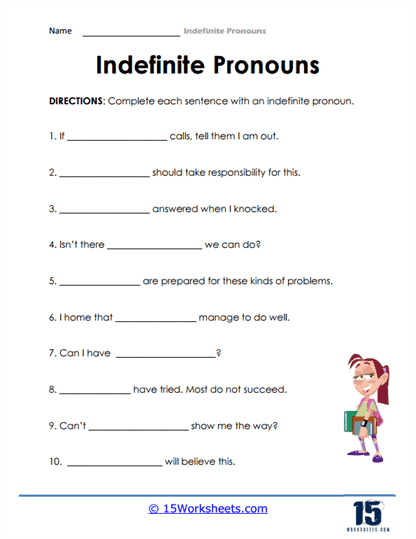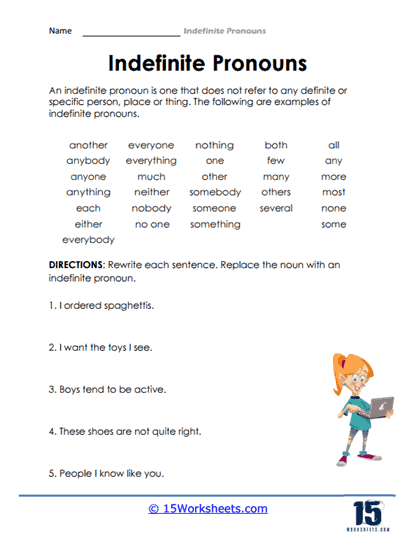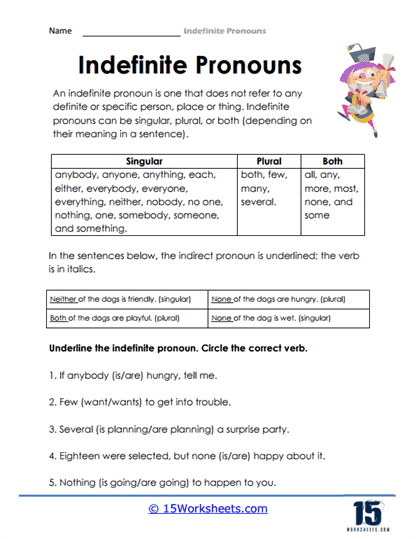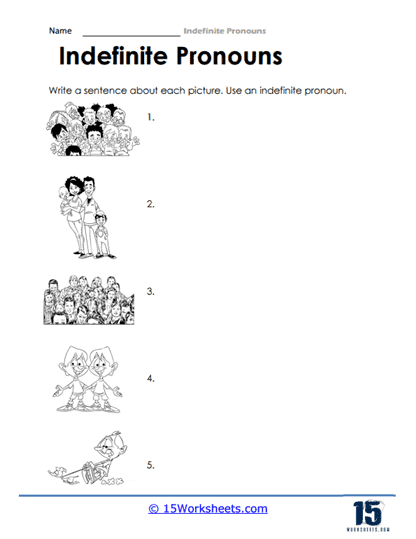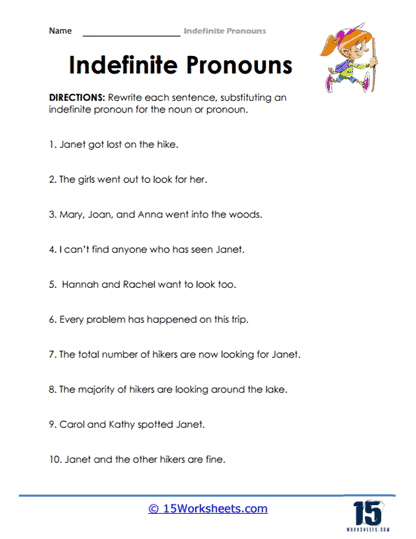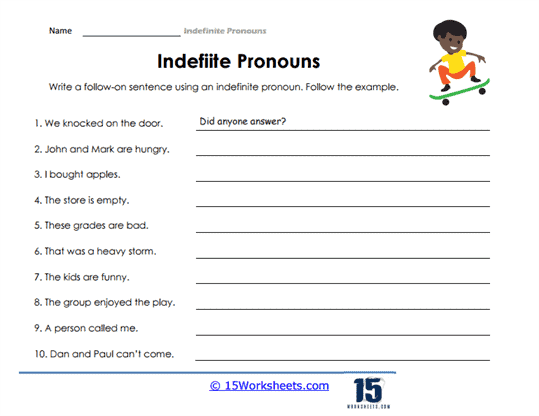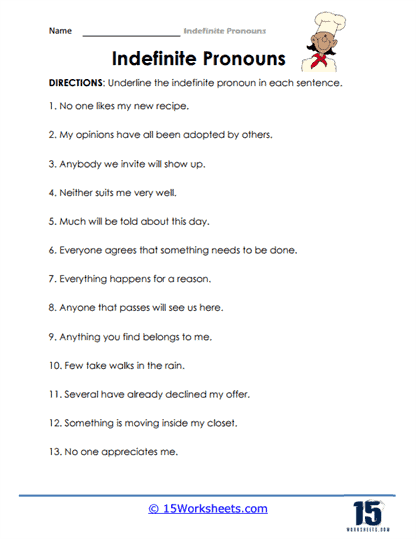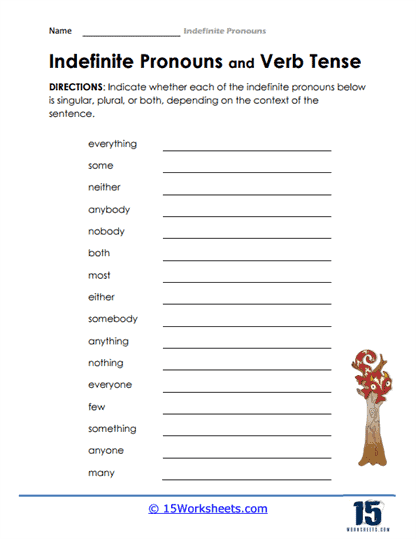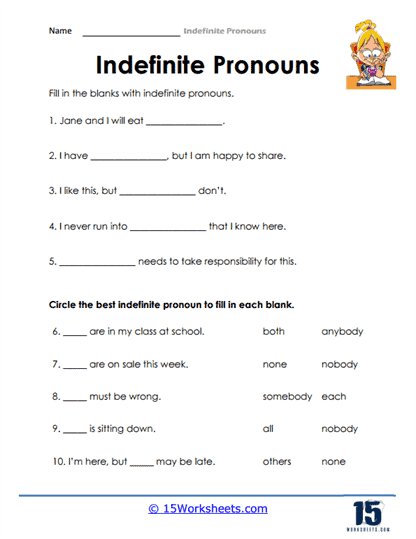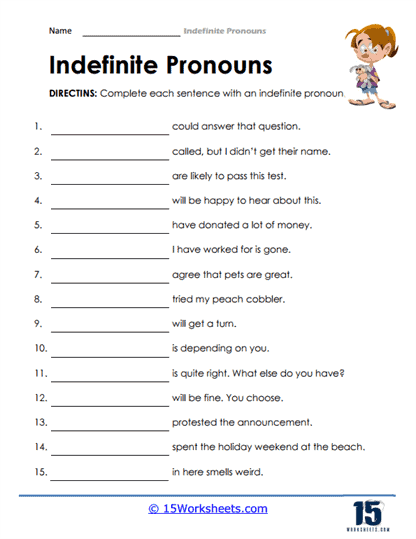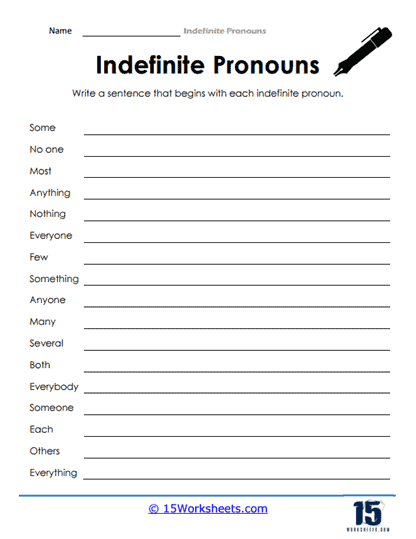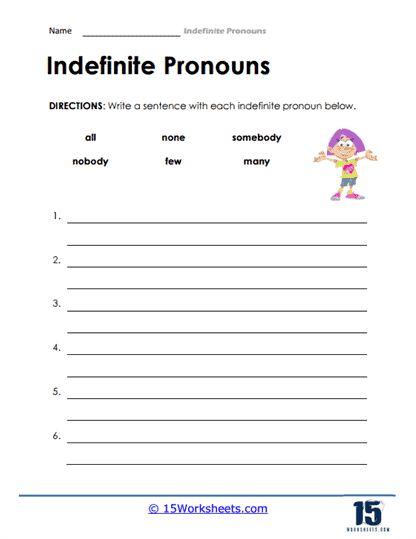Indefinite Pronouns Worksheets
All About These 15 Worksheets
These Indefinite Pronouns worksheets are a helpful tool for students to learn about them. Some worksheets begin with a brief explanation of what indefinite pronouns are and how they are used in sentences, which are ideal for teachers to use in introducing the topic to their students. Through these worksheets, students will:
- Identify indefinite pronouns in sentences by understanding their form and function;
- Supply incomplete sentences with the appropriate indefinite pronouns;
- Write their own sentences that use indefinite pronouns;
- And be familiar with the commonly used indefinite pronouns.
Overall, these worksheets are a comprehensive and engaging resource that will help students understand and master the use of indefinite pronouns in English.
What Are Indefinite Pronouns?
In English grammar, an indefinite pronoun is used when a noun (i.e., person, place or thing) or the amount of a noun is unknown. The following sentences use indefinite pronouns:
1. Can anyone hear me?
The pronoun anyone can refer to a parent, sibling, teacher, etc.
2. Nothing makes Annie happy.
The pronoun nothing can refer to numerous items that aren’t improving Annie’s mood.
3. Both are yummy choices for dinner.
The pronoun both can mean a variety of food options.
4. Mark picked several to show the team.
The pronoun several can mean a number of unspecified things in this sentence.
Singular Indefinite Pronoun
If an indefinite pronoun ends with -one or -body, it is singular as it is meant to address a single person within a group. This rule is valid for the pronouns everyone and everybody as well. That is because in both cases, each person is being considered, despite being referred to collectively. Singular indefinite pronouns are given below with examples.
| another | anybody | anyone |
| anything | each | each one |
| either | everybody | everyone |
| everything | little | much |
| neither | nobody | no one |
| nothing | somebody | someone |
| something | one | other |
Sentence Examples
In each of the following sentences, the singular indefinite pronoun can be replaced with a singular noun and still be correct.
- Does anybody know where the ladder is?
- Anyone can join the school play.
- Someone had knocked over mom’s expensive vase.
- Hand over another one.
- Carrie tried each one before placing an order.
- I am not a fan of either.
- Everyone forgot her birthday was today.
- Mathew lost everything when his luggage was stolen.
- Little is known about Mr. Smith, the reclusive millionaire.
- Nobody knows who vandalized the school wall.
- I heard no one is going to watch the basketball game.
- Something doesn’t feel right about the color.
Plural Indefinite Pronoun
A plural indefinite pronoun is used in place of a plural pronoun or a plural noun. These pronouns are given in the table below.
| both | few | fewer |
| many | others | several |
Sentence Examples
Plural indefinite pronouns are used when there is an indication of more than one person, place or thing.
- We invited the whole school to the party, but only a few came.
- Fewer are interested in the pottery class.
- Many have asked for her cupcake recipe.
- Both are needed to solve the puzzle.
- He wanted to move to the next question, but others were stuck on the last one.
- Several haven’t met the new department head.
Both Singular and Plural Indefinite Pronouns
Specific indefinite pronouns can be used in single and plural cases depending on the context of the noun in the sentence. These pronouns are:
| all | any | more |
| none | some | such |
| most |
Sentence Examples
Many of the following examples are grammatically correct, even though they do not sound right. This discrepancy is due to the changes in conversational language over time, which differs from historical English.
- All of the milk has spoiled. (All refers to the milk, which is singular)
- All of the birds flew out of the cage. (All refers to the birds, which is plural)
- Is any for Mary? (any refers to Mary, who is singular)
- Have any replied back? (any refers to people, who are plural)
- Most of the pizza was eaten by the children. (Most refers to the cake, which is singular)
- Most of the chairs were broken. (Most refer to the chairs, which is plural)
- Some of her dress was ruined by the rain. (some refers to a dress, which is singular)
- Some of her dresses were ruined by the rain. (some refer to the dresses, which is plural)
- Why is none ready yet? (None refer to something singular)
- None were interesting. (None refer to something that is plural)


